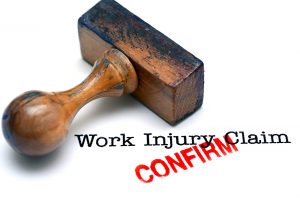
If you have questions about the NC Work Comp laws, like how to file for workers comp in North Carolina and what that entails, Kevin Jones is a Board Certified Workers’ Compensation Specialist in North Carolina.
Filing for workers comp can feel like a difficult process, but we’ve compiled this list of steps you should take once you’ve been injured on the job.
An estimated 2.9 million nonfatal workplace injuries occurred in the American workplace in 2016. Almost 900,000 of those required time away from work.
The NC Work Comp laws can be a bit complicated. We offer a case evaluation and will provide information about your legal options free of charge – Kevin Jones, NC Personal Injury Attorney
1) Report the Workplace Injury in North Carolina
In North Carolina, it is mandatory to report a workplace injury to your  supervisor or employer. Even if you think your injury is minor, it’s a good rule of thumb to report to your supervisor in writing, including the important details of what happened.
supervisor or employer. Even if you think your injury is minor, it’s a good rule of thumb to report to your supervisor in writing, including the important details of what happened.
Include information like:
- Date of the on the injury
- Time of accident
- Witnesses to the event
Notify your employer no later than 30 days after your injury.
2) Seek Medical Attention
If your NC workplace injury requires medical treatment, do not wait. Go to your nearest emergency medical treatment center or urgent care facility. Tell the healthcare provider your injury occurred on the job. This allows them to send all their bills and other expenses directly to your employer and their insurance agency.
3) Legal Representation: Workers Compensation Attorney
It’s a good idea to understand your legal rights and options. At the Dodge Jones Injury Law Firm we provide a free case evaluation. It costs nothing to ask questions and talk to an experienced NC Work Comp lawyer.
It’s also OK if you choose not to pursue a claim. We will not pressure you to move forward or to retain our law firm for legal representation. Our law firm helps clients in Greenville NC, New Bern, Morehead City, Jacksonville NC and Beaufort, North Carolina.
4) File under the North Carolina Workers’ Compensation Act
File “NOTICE OF ACCIDENT TO EMPLOYER AND CLAIM OF EMPLOYEE, REPRESENTATIVE, OR DEPENDENT” FORM 18 NC WORK COMP LAWS
This is the official workers’ compensation claim. Your employer might have copies of these available. In the case that your employer doesn’t file these forms properly, you may submit the FORM 18 directly to North Carolina’s Industrial Commission.
Make sure you or your employer file this form within two years of the date of your injury.
5) Eligibility Determination
The North Carolina Industrial Commission oversees all workers comp claims in the state. North Carolina has adopted a no-fault workers’ compensation system, which means that as long as your injury took place on the job within the scope of your work activities, you will typically be able to receive benefits.
The NCIC will look over your claim and forward it to your employer’s insurance company. From here, that insurance company or workers comp administrator will determine whether you are eligible for benefits.
They will look over your medical records, your work experience, and wages. They might also order a medical examination with a doctor of their choosing to assess your condition. An assessment of your ability to perform work duties might also be required.
This might seem like a lengthy process, and when you’re injured it absolutely is. Luckily, North Carolina law requires that the insurance company approves or denies your workers’ compensation benefits in under 14 days of receiving your claim.
If your claim went through without issue, great! You’ll start receiving the benefits you need.
If your claim was denied, which unfortunately happens often, there are still steps you can take.
6) Appeal
Many insurers will routinely deny perfectly viable workers comp claims because it is just assumed that the average worker won’t appeal. Don’t let this be the case for you.
You have the right to appeal any denied workers’ compensation claim. To begin this process, you have to file a request to meet with the North Carolina Industrial Commission.
While having a lawyer in the earlier parts of the workers’ compensation process might have been helpful, now it is absolutely essential. The Information Specialists in North Carolina can assist you with your claim, but it is not allowed to provide you with legal advice.
If your employer has a lawyer, there is no reason for you to be at a disadvantage. It’s a lawyer’s job to see that you are being treated fairly and to fight for the benefits you deserve.
7) How can an NC Work Comp Lawyer help?
Hopefully, everything with your workers’ compensation claim has gone smoothly. But, this is often not the case.
In addition to your employer not accepting your claim, there are other complications that could arise.
How to choose a NC Work Comp Lawyer
If the settlement offer you are given doesn’t cover all of your wages or medical bills, find yourself a lawyer. There are fail safes in place to make sure you are treated fairly, but many times judges just make sure you aren’t being thrown under the bus before they sign off on your settlement. A lawyer will fight for you to get you the best settlement possible.
If you are permanently disabled, partially or totally, you might qualify to receive weekly payments from your employer. Insurance companies will do anything they can to dodge paying these settlements, so a workers compensation attorney you can count on is a necessity.
If your boss retaliates against you for filing a claim, such as demoted or cut your hours, reduced your pay, or discriminated against you in any way, a workers comp attorney will help protect your legal rights.
Need More Help?
When you file for workers comp, you are starting a process that can seem sticky and full of issues. But it is important that you go through with this to get yourself and your family the benefits you deserve.
If you have been injured on the job and think you need legal representation, call NC Board Certified Workers’ Compensation Specialist Kevin Jones 877-622-6671 or email Kevin@DodgeJones.com
 North Carolina Workers' Compensation News
North Carolina Workers' Compensation News









